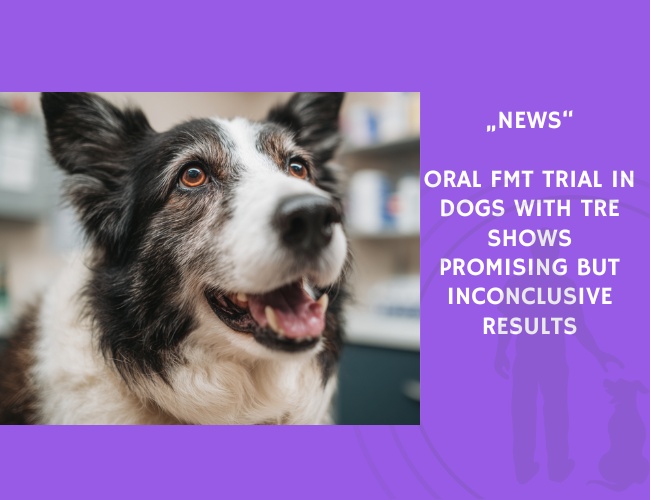Dogs diagnosed with **tylosin-responsive enteropathy (TRE)** are commonly prescribed the antibiotic tylosin, often for extended periods. However, growing concerns about **antibiotic resistance** have spurred interest in microbiome-based alternatives such as **fecal microbiota transplantation (FMT)**. A 2024 proof-of-concept study by **M. Hanifeh and colleagues** explored the effectiveness of **oral FMT capsules** in managing TRE in dogs.
Fourteen dogs were randomly assigned to receive either FMT (7 dogs) or placebo (7 dogs) capsules over a four-week period, followed by a four-week observation phase. Researchers monitored fecal consistency, **relapse rates**, and changes in **gut microbiome composition**, comparing the results to both a healthy donor dog and 30 healthy control dogs.
By the end of the trial, **71.4% of the FMT group** and **50% of the placebo group** showed no relapse during treatment. Although more FMT-treated dogs remained stable, the difference was **not statistically significant**, likely due to the **small sample size**. After follow-up, two dogs in the FMT group and one in the placebo group relapsed.
Despite these limitations, the study found that both groups exhibited **increased microbiome diversity** after treatment, and approximately **30.4% of donor bacterial strains successfully engrafted** in FMT recipients. The most common engrafted strains included **Blautia**, **Ruminococcus gnavus**, and **Fournierella massiliensis**.
The findings support the safety and biological plausibility of FMT as a treatment for chronic enteropathies like TRE, though **larger-scale studies** are needed to confirm clinical efficacy. For dogs reliant on tylosin, FMT may offer a **future antibiotic-sparing strategy** that harnesses the power of the microbiome.
Source: M. Hanifeh, E. Scarsella, C. A. Rojas, H. H. Ganz, M. Huhtinen, T. Laine, T. Spillmann. Published in Veterinary Sciences, Volume 11, September 1, 2024.










